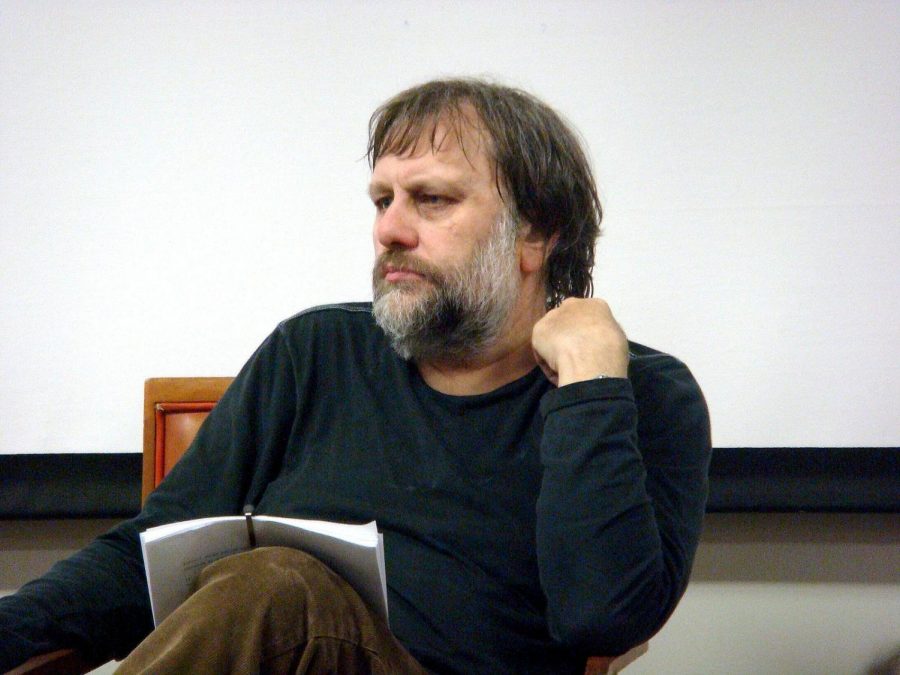Public intellectuals instill false beliefs
Slovenian philosopher Slavoj Zizek is pictured in Liverpool. Zizek and psychologist Jordan Peterson debated in Canada on April 19 at a sold-out event.
May 14, 2019
On April 19, Canadian psychologist Jordan Peterson and Slovenian philosopher Slavoj Zizek held a debate in Toronto entitled “Happiness: Capitalism vs. Marxism.” Their debate was highly anticipated in the online-intellectual community. Tickets sold out well in advance of the event, and Peterson noted tickets were sold by scalpers for more than the Maple Leafs game across town. However, like the hockey game, the debate was about entertainment. The two ostensible opponents agreed more than they argued, talked past each other and displayed their growing disconnect from reality.
The real problem of the debate is not unique to either Peterson or Zizek but one at the heart of public intellectualism. Despite all the mythos surrounding the craft, it is really about showmanship. To stay relevant as a public thinkers, they have to continuously pump out new ideas. This incentivizes quantity over quality and forgoes intricacies to make complex theories digestible and exciting to a mass audience.
One thing revealed in the debate was despite how much Peterson talks about Marx, he either does not understand him or intentionally misconstrues him. He admitted in his introduction he read “The Communist Manifesto” for the first time since he was a teenager in preparation for the debate. He admitted he was confused by basic concepts like why Marx praised capitalism’s ability to create wealth and viewed it as a necessary stage in human development. The nuances and complexities of the people he debates against usually fall to the wayside. It is not in Peterson’s interest to highlight the finer points of Marxism. Instead, it is much more rhetorically titillating to use it as a scapegoat for every bad thing that has happened in Eastern Europe.
For someone like Peterson — who is interested in the classical liberal notion that everyone’s ideas should be listened to and debated — he makes plenty of bad faith arguments about Marx. Regardless of the merit of Marx’s work, it should be conceded he was a complex thinker whose ideas have influenced millions of people and are the foundations for fields like sociology and political economy (plenty of non-communists utilize his methods). For this reason, they deserve to be understood properly whether you agree with him or not.
Beyond his bad-faith arguments, Peterson’s Marxist strawmen aren’t even effective against Zizek. Despite being a self-described Marxist, Zizek was a dissident in communist Yugoslavia and left the party in protest; he is anti-authoritarian. Despite this, he is still a Marxist. This is because he finds Marxist analysis is a useful tool in understanding the world. The two essentially agreed well-regulated capitalism was ideal.
Get The Daily Illini in your inbox!
With Zizek, the problem is different but comes from the same source. The Slovenian moved around the debate covering a very wide range of topics but offered little breadth and rarely debated Peterson’s claims. Zizek also has been selling a sort of liberal pessimism that plays to people’s fear.
It is ironic public intellectuals box themselves into restrictive labels. Once they gain a following that shares their convictions, it is in their interest to preserve that ideological bubble. If one of them were to make too many concessions or praise an aspect of the movements which they have demonized, their followers, accustomed to easily digestible narratives that appeal to their sensibilities, would move to the next public intellectual.
What matters in public intellectualism is not in deep readings but producing a lot of ideas that catch the public’s attention — regardless of how half-baked they are. This is schtick works when they are alone and unchallenged. But once someone else joins them on the stage, their argument begins to fall apart as we witness their lack of intellectual dexterity to debate with other people. Instead they prefer to engage only with their own ideas in a manner devoid of complexity. Peterson, either deliberately or unknowingly (either explanation is equally damning), misconstrues Marx, despite spending a career railing against him, and Zizek admits he often uses the word “communism” simply to be provocative.
Despite this, Zizek and Peterson are not useless. Thousands of young men have said Peterson helped them “get their act together” and Zizek, for his part, has produced thoughtful critiques and books that do not fall into the trap of public intellectualism. However, they are most useful when used as introductory figures. They can help people gain an elementary understanding of philosophy or politics, but to truly grasp the field you need to do your homework and read the writers they rhetorically use. However, the problem with public intellectuals is they make people feel like experts when they’re not.
Joseph is a junior in LAS.






